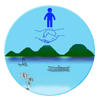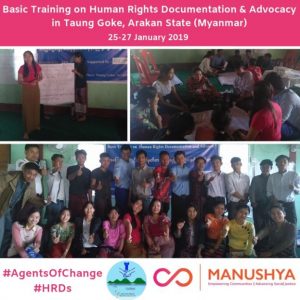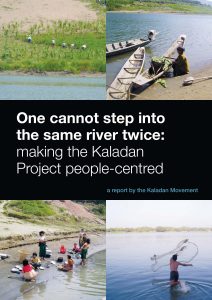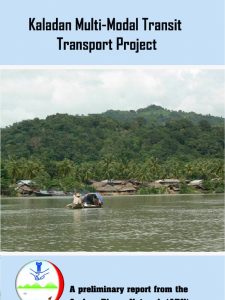
TAUNG GOKE, Myanmar – Arakan Rivers Network (ARN) held a “Basic Training on Human Rights Documentation & Advocacy” in Rakhine/Arakan state in southern Myanmar from 25-27 January 2019. Twenty-three participants from five townships of Taung Goke, Man Aung, Ramree, Thandwe and Ann attended the training, who were government teachers, university students as well as representatives of local political parties and local CSOs. The training increased awareness of human rights standards among the participants and their capacities to monitor and document human and environmental rights challenges due to development and business projects in the state and to undertake effective advocacy actions to address those challenges.
The three-day training began with discussions on the concept and principles of human rights and how human rights are defined at national and international levels. The participants were informed about the Universal Declaration of Human Rights (UDHR), including through a video. On the second day, the training focused on the rights of indigenous peoples with an analysis of the right to Free, Prior and Informed Consent (FPIC) within the UN Declaration on the Rights of Indigenous Peoples (UNDRIP). FPIC is a specific right that pertains to indigenous peoples to ensure their right to participation and self-determination. It entitles them to effectively determine the outcome of decision-making that affects them. FPIC requires that prior to a business or development project being undertaken, which would impact on lands or resources of indigenous peoples, the affected communities should be involved in the decision making process at all stages, including the design and consideration of alternatives.
“In Arakan State, there are several projects such as seaports, hydropower dams and mining that indigenous communities are opposing in order to safeguard their livelihoods, rights and environment. As the environmental and social costs of these projects far outweigh their benefits, it is crucial to educate and empower local human rights defenders and their communities to monitor and report human rights abuses and carry out effective advocacy against the challenges of those projects,” said Ting Oo, Arakan Rivers Network’s Executive Director, who facilitated the training.
Further, the second day continued with an analysis of Myanmar’s 2008 Constitution and other domestic laws, how they define indigenous rights and their intrinsic contradictions with these rights. After an introduction of human rights documentation approach, the training participants were informed about 17 common human rights violations categories in Myanmar. They were provided guidance on how they can monitor and document these abuses such as formats to be used, information required relating victims/perpetrators, methods to collect and verify information.
The participants learnt about national human rights mechanisms (Myanmar National Human Rights Commission (MNHRC), courts, etc.) and UN Human Rights mechanisms, particularly the Universal Periodic Review (UPR) and how to engage with them as well as useful advocacy tips on the third and last day. They then worked in groups to draft complaints to MNHRC or other national authorities. Lastly, the participants were divided in groups by townships in order to prepare further action plans to address human rights challenges in their area.
“After the training, the participants plan to carry out further awareness raising on human rights in their communities, submit complaints to national authorities on their human rights challenges and also aim to conduct advocacy at international levels, ” Ting Oo said. The following day, a visit to a local mining site operated by a Vietnamese company was organized for the participants to witness and document impacts first hand.
Manushya Foundation is extremely proud and honored to work with the Arakan Rivers Network and to contribute to the empowerment of local human rights defenders and their communities in Myanmar. Human rights understanding is necessary and crucial to effectively empower local human rights defenders and their communities to stand up, voice their concerns and bring about changes in the human rights situation on the ground in Myanmar.
https://www.manushyafoundation.org/single-post/2019/02/12/Myanmar-Basic-Training-on-Human-Rights-Documentation-and-Advocacy-organized-in-Rakhine-State?fbclid=IwAR3So8pIyfhrGUWOWW4pNJF-Q6yCmEEZ3EyBSnYK9igtWW6ZRnPJRIhP3SU



